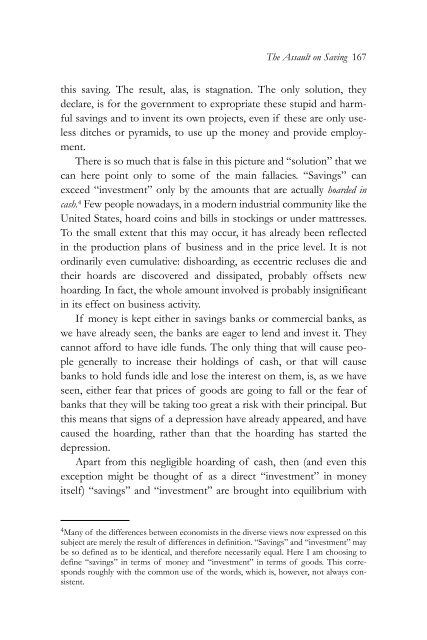1gDdM7w
1gDdM7w
1gDdM7w
- No tags were found...
Create successful ePaper yourself
Turn your PDF publications into a flip-book with our unique Google optimized e-Paper software.
The Assault on Saving 167this saving. The result, alas, is stagnation. The only solution, theydeclare, is for the government to expropriate these stupid and harmfulsavings and to invent its own projects, even if these are only uselessditches or pyramids, to use up the money and provide employment.There is so much that is false in this picture and “solution” that wecan here point only to some of the main fallacies. “Savings” canexceed “investment” only by the amounts that are actually hoarded incash. 4 Few people nowadays, in a modern industrial community like theUnited States, hoard coins and bills in stockings or under mattresses.To the small extent that this may occur, it has already been reflectedin the production plans of business and in the price level. It is notordinarily even cumulative: dishoarding, as eccentric recluses die andtheir hoards are discovered and dissipated, probably offsets newhoarding. In fact, the whole amount involved is probably insignificantin its effect on business activity.If money is kept either in savings banks or commercial banks, aswe have already seen, the banks are eager to lend and invest it. Theycannot afford to have idle funds. The only thing that will cause peoplegenerally to increase their holdings of cash, or that will causebanks to hold funds idle and lose the interest on them, is, as we haveseen, either fear that prices of goods are going to fall or the fear ofbanks that they will be taking too great a risk with their principal. Butthis means that signs of a depression have already appeared, and havecaused the hoarding, rather than that the hoarding has started thedepression.Apart from this negligible hoarding of cash, then (and even thisexception might be thought of as a direct “investment” in moneyitself) “savings” and “investment” are brought into equilibrium with4 Many of the differences between economists in the diverse views now expressed on thissubject are merely the result of differences in definition. “Savings” and “investment” maybe so defined as to be identical, and therefore necessarily equal. Here I am choosing todefine “savings” in terms of money and “investment” in terms of goods. This correspondsroughly with the common use of the words, which is, however, not always consistent.


